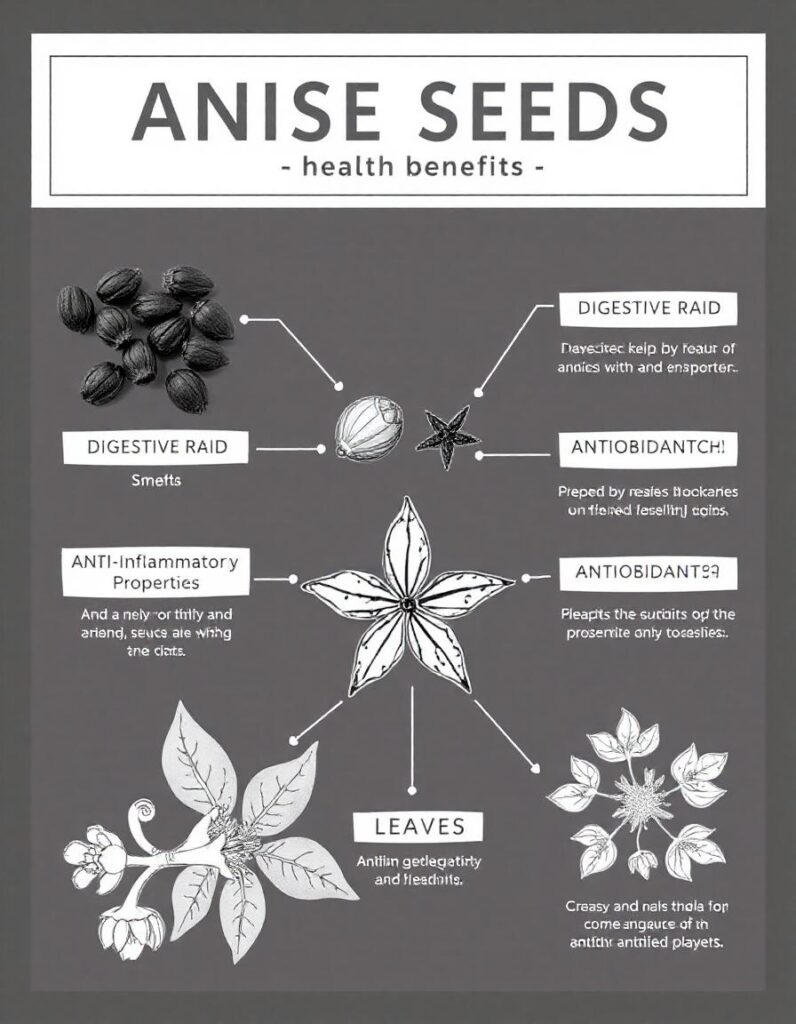Anise Seed is a plant known for its individual licorice-like flavor often used to increase the taste of desserts and drink. Beyond its culinary uses anise has been valued for its medicinal properties for centuries.
Also referred to as aniseed or by its scientific name Pimpinella anisum, this plant is related to carrots, celery, and parsley. Anise can grow up to about 3 feet (1 meter) tall, producing small white fruits known as anise seeds.

Table of Contents
Here are 9 health benefits and uses of anise seed, supported by research:
1. Nutrient-Packed
Even though you might only use small amounts of anise seeds in recipes they are rich in vital nutrients. These anise seeds are particularly high in iron, key for maintaining healthy blood cells. They also contain metal, a mineral that acts as an anti-oxidant and supports metabolism.
For instance, one tablespoon (7 grams) of anise seed contains:
- 23 calories
- 1 gram of protein
- 1 gram of fat
- 3 grams of carbohydrates
- 1 gram of fiber
- 13% of your daily iron requirement
- 7% of your daily manganese requirement
Summary: Anise seeds are low in calories but packed with essential minerals like iron and manganese, making them a nutritious addition to your diet.

2. Supports Mental Health
Depression is a much bigger mental health condition. Research has shown that anise seeds have antidepressant properties. For example, studies have shown that anise seed extract can be as effective as some prescription medications to alleviate symptoms of depression. In one study, women who took anise seed powder three times daily reported significantly fewer symptoms of postpartum depression.
Summary: Anise seeds have been shown to help reduce symptoms of depression, making them a potential natural remedy for improving mental health.
3. Helps Prevent Stomach Ulcers
Stomach ulcers are painful sores that develop in the stomach lining. While medications typically reduce stomach acid to treat ulcers, some studies suggest that anise seeds might help by reducing stomach acid production and protecting the stomach lining.
Summary: Anise seeds may help prevent stomach ulcers by reducing acid levels and protecting the stomach lining, though more research is needed.
4. Fights Infections
Anise seeds have strong antimicrobial properties, which means they can help prevent infections by inhibiting the growth of harmful fungi and bacteria. Research has shown that anise essential oil is effective against specific fungi and bacteria, including those responsible for skin infections and cholera.

Summary: Anise seeds can help fight infections by preventing the growth of harmful fungi and bacteria.
5. Alleviates Menopause Symptoms
Menopause often brings symptoms like hot flashes and fatigue due to decreased estrogen levels. Anise seeds may help by mimicking the effects of estrogen, potentially reducing these symptoms. In a study, women who took anise capsules experienced a significant decrease in the severity and frequency of hot flashes.
Summary: Anise seeds may help ease menopause symptoms like hot flashes by mimicking estrogen in the body.
6. Helps Regulate Blood Sugar
Some studies suggest that anethole, a compound found in anise seeds, may help manage blood sugar levels. For example, research in diabetic rats found that anethole helped lower blood sugar by enhancing the function of insulin-producing cells.
Summary: Anise seeds may aid in regulating blood sugar levels, though further studies are needed to confirm this effect in humans.
7. Reduces Inflammation
Inflammation is a natural immune response, but chronic inflammation can lead to serious health issues like heart disease and diabetes. Anise seeds are rich in antioxidants, which can help reduce inflammation and protect against chronic diseases.
Summary: Anise seeds can help reduce inflammation, potentially preventing chronic diseases.
8. Eases Digestion
Anise seeds have traditionally been used to relieve digestive issues like bloating, gas, and indigestion. Their carminative properties help expel gas from the digestive tract, providing relief from discomfort.
Summary: Anise seeds can support digestive health by easing symptoms like bloating and indigestion.
9. Improves Respiratory Health
Anise seeds are often used in traditional remedies to treat coughs and congestion. Their expectorant properties help loosen mucus, making it easier to expel and clear the airways.
Summary: Anise seeds can help improve respiratory health by relieving symptoms of cough and congestion.
Possible Side Effects
While anise seeds are generally safe for most people, they can cause allergic reactions in some, especially those allergic to related plants like fennel or celery. Additionally, because anise mimics estrogen, it may worsen symptoms of hormone-sensitive conditions such as breast cancer.
Summary: Anise seeds are safe for most people, but those with allergies or hormone-sensitive conditions should exercise caution.
How to Use Anise
Anise is available in several forms, including dried seeds, oil, powder, and extract. It’s a versatile ingredient used to enhance the flavor of foods and beverages or added to skincare products for its fragrance.
For medicinal purposes, daily doses of 600 mg to 9 grams have been found effective for conditions like depression. A daily intake of up to 20 grams of anise seed powder is considered safe for healthy adults.
Summary: Anise is a versatile plant available in various forms, with small amounts typically providing a significant impact in recipes and remedies.
Anise seed is a potent plant rich in nutrients and offers a wide range of health benefits. It has antifungal, antibacterial, and anti-inflammatory properties and may help with conditions like stomach ulcers, blood sugar control, and depression. Including anise seed in a balanced diet and healthy lifestyle may contribute to better overall health.
What are the main health benefits of anise seeds?
Anise seeds are known for their potential benefits, such as improving digestion, reducing symptoms of depression, balancing blood sugar levels, easing menopause symptoms, and offering anti-inflammatory and antimicrobial properties.
How can anise seeds be used in cooking?
Anise seeds are commonly used to flavor baked goods, such as cookies and cakes, as well as in spice blends for savory dishes. They can also be added to soups, stews, and herbal teas to enhance flavor.
Are anise seeds effective in treating digestive issues?
Yes, anise seeds are often used to relieve digestive issues like bloating, gas, and indigestion. They can also help stimulate appetite and improve overall digestive health.
Can anise seeds help reduce symptoms of menopause?
Anise seeds may mimic the effects of estrogen in the body, which can help reduce symptoms like hot flashes and support bone health during menopause.
What is the difference between anise seeds and fennel seeds?
While both anise and fennel seeds have a licorice-like flavor, anise seeds are smaller and have a more intense flavor. Fennel seeds are larger, slightly sweeter, and less pungent.
How do anise seeds contribute to respiratory health?
Anise seeds can help soothe respiratory issues like coughs and congestion due to their expectorant properties. They are often used in herbal remedies to clear mucus and ease breathing.
Are there any side effects of consuming anise seeds?
While anise seeds are generally safe, some people may experience allergic reactions, especially if they are allergic to related plants. Those with hormone-sensitive conditions should also consume anise seeds with caution
Can anise seeds be used as a natural remedy for depression?
Research suggests that anise seeds may have antidepressant properties, potentially helping to reduce symptoms of depression in some individuals.
How does anethole in anise seeds impact blood sugar levels?
Anethole, the active compound in anise seeds, may help regulate blood sugar levels by improving insulin function, though more research is needed to confirm this effect in humans.
What are the best ways to store anise seeds for maximum freshness?
To keep anise seeds fresh, store them in an airtight container in a cool, dark place. This will help preserve their flavor and potency.
How can anise seeds be used in herbal teas?
- Anise seeds can be brewed into herbal teas by steeping them in hot water. The tea can help with digestion, respiratory issues, and provide a soothing effect.
Is it safe to consume anise seeds during pregnancy?
- Pregnant women should consult with a healthcare provider before consuming anise seeds, as they have estrogen-like effects that may not be suitable during pregnancy.
How do anise seeds compare to star anise in flavor and use?
- While both anise seeds and star anise have a similar licorice flavor, star anise has a stronger, more intense flavor and is commonly used in Asian cooking, whereas anise seeds are more common in European and Middle Eastern cuisines.
Can anise seeds help prevent bacterial infections?
- Anise seeds have antimicrobial properties that may help prevent the growth of certain bacteria and fungi, contributing to overall health and infection prevention.
How are anise seeds traditionally used in different cultures?
- Anise seeds have a long history of use in various cultures for culinary and medicinal purposes. They are used in Middle Eastern, Mediterranean, and Indian cuisines, as well as in traditional medicine practices to treat ailments such as digestive issues, respiratory problems, and more.